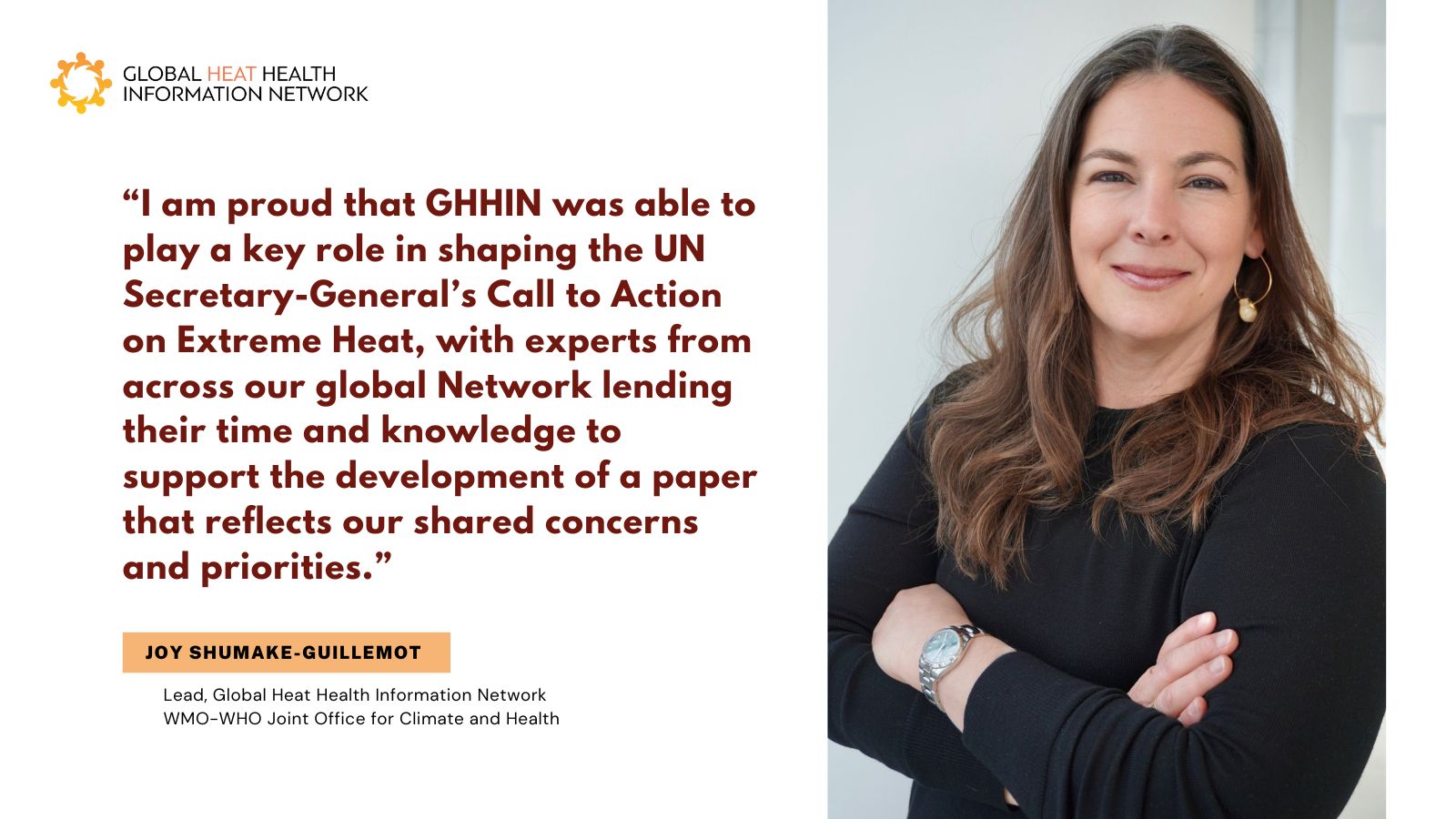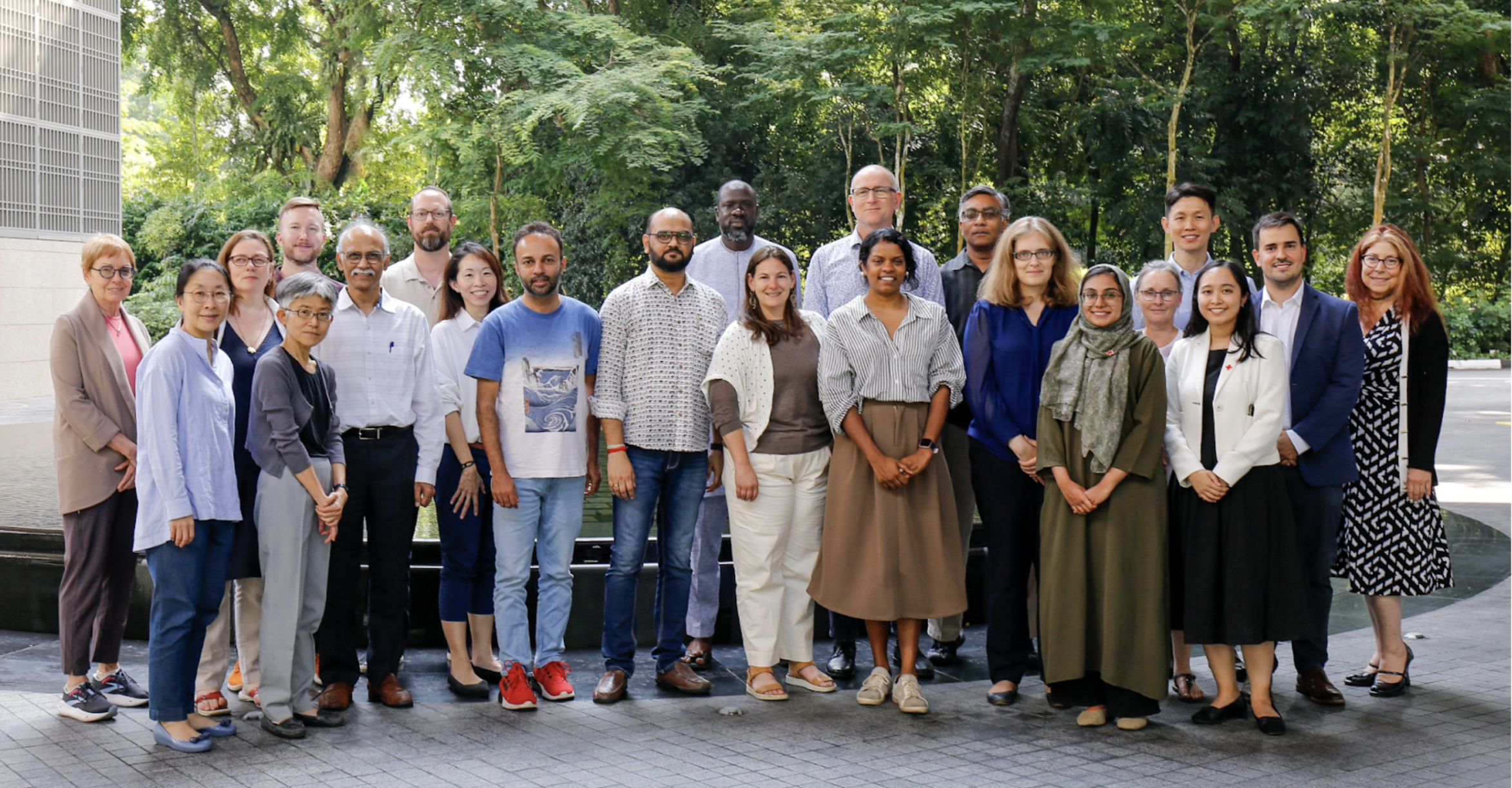GHHIN supports UN Secretary-General’s call to urgent action on extreme heat
Published: July 26, 2024
The Global Heat Health Information Network is proud to have supported and to endorse the United Nations Secretary-General’s Call to Action on Extreme Heat, which brings together the diverse perspectives and opportunities of ten specialized UN agencies (FAO, ILO, OCHA, UNDRR, UNEP, UNESCO, UN-Habitat, UNICEF, WHO, WMO) in a first-of-its-kind joint product, underscoring the multi-sectoral impacts of extreme heat.
Earth is becoming hotter and more dangerous for everyone, everywhere. Billions of people around the world are wilting under increasingly severe heat waves driven largely by a fossil-fuel charged, human-induced climate crisis. Extreme heat is tearing through economies, widening inequalities, undermining the Sustainable Development Goals, and killing people.
Heat directly impacts people and amplifies the risks of wildfire, droughts, and water shortages and food insecurity. Therefore the acute, long-term, and compounding risks of extreme heat must be managed across society by multiple sectors.
The Call to Action calls for an urgent and concerted effort to enhance international cooperation to address extreme heat in four critical areas:
- Caring for the vulnerable
- Protecting workers
- Boosting resilience of economies and societies using data and science
- Limiting temperature rise to 1.5°C by phasing out fossil fuels and scaling up investment in renewable energy.
The Call to Action was peer-reviewed by the Network’s leadership team, which serves as the heat expert reference group for the World Health Organization (WHO) and World Meteorological Organization (WMO) and is comprised of leading experts from academia, civil society, governments and UN agencies (see full list below).
“Heat impacts everyone, everywhere. We need stronger cooperation across the UN system to more rapidly support Members and communities with sound information to make decisions, and effective resources and actions to face the rapidly rising temperatures.” says Joy Shumake-Guillemot, Network lead, “I am proud that GHHIN was able to play a key role in shaping the UN Secretary-General’s Call to Action on Extreme Heat, with experts from across our global Network lending their time and knowledge to support the development of a paper that reflects our shared concerns and priorities.”

…
Advancing the global heat agenda
The GHHIN leadership team met in Singapore from 22-26 July to update the Network’s ambitions to leverage its expanding partnerships for national action and to support the global strategy for heat action.
In preparation, this year the Network, together with the UNDRR Center of Excellence for Disaster and Climate Resilience and Duke University Heat Policy Innovation Hub, have engaged with over a dozen UN agencies and the International Federation of the Red Cross and Red Crescent Societies to understand the scope of current heat resources and activities, and recommend opportunities to better leverage these organizations strengths to support national and local heat action.

See also: Duke Experts Partner with U.N. to Advance Heat Solutions
The Network thanks its leadership team for their expert review of the Call to Action. Members represent the following organizations:
- WHO
- ILO
- WMO
- UNICEF
- UNESCAP
- Asian Disaster Preparedness Center
- Red Cross Climate Center
- International Federation of Red Cross and Red Crescent Societies
- Natural Resource Defense Council
- University of Washington
- University of Sydney
- University of Arizona
- London School of Hygiene and Tropical Medicine
- University of Hong Kong
- National University of Singapore
- US Center for Disease Control
- South African Medical Research Council
- Health Canada
- Ministry of Health Argentina
- Santé Publique France
- UK Health Security Agency
- Ministry of Health Singapore
- US National Atmospheric and Oceanic Administration
- UK Met Office
- Singapore National Environment Agency
- Senegal Meteorological Agency (ANACIM)
- Indian Institute of Tropical Meteorology.